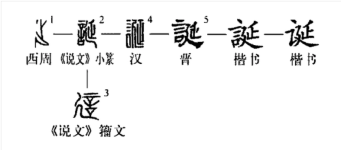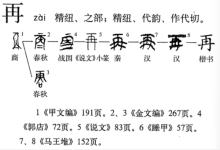Egon
Well-known member
The hanzi/kanji for "Resurrection" is 再誕 - it means and reads the same in Chinese as in Japanese: Saitan/Zàidàn.
@STanBlank @GuangXia_666 @Nagaraja
I found that through the title of a RHP book, "Buddah Saitan" (as you can guess, "The Rebirth of Buddah") - although obviously they don't own the word, and anyone can use a search engine for other examples online.
The book also exists in Chinese using the same Saitan symbols although if you put in it sounds a little different with as "ZaiDan" (Z/S's and T/D's also happen to be interchangeable over time in other languages too like the runic alphabets).
Japanese: 仏陀再誕 : https://www.amazon.co.jp/仏陀再誕-携帯版-books-大川隆法/dp/4876883866
Chinese: 佛陀再誕 : https://www.books.com.tw/products/0010917983
The above is just for reference and should be ignored otherwise.
Now the following are purely my speculations based on etymology of some radicals and how these look like the Runes, and not based on any knowledge on East Asian spiritual texts at all.
Notice how in the kanji for birth (tan) in Sai(再)tan(誕), the symbol 廴 (yin) in the middle of tan looks like the powerhouse rune of Ingwaz (notice Yin-gwaz), or the life-energy rune of Sowilo on top of Odthala, or even the life-giving rune of Berkano, which is also close to another yin, the symbol 阝 that writes yin & yang (陰陽).
Tan is written with the radicals for speech, yin, and righteous:
誕
言 Speech (vibration/mantra) generates
廴 yin: life-force/fertility/virility (Ingwaz, Berkano, or Sig/energy descending into Odthal/body), giving birth to
正, a "righteous" (perfected) being.
The other one being Sai: 再 ("again", the "re" in "rebirth"), with the radicals for the number "one" 一, "earth" 土, and "month" or "moon" 月, namely the natural cycles, timing with the earth and the moon for one's transformation etc.
@STanBlank @GuangXia_666 @Nagaraja
In Ancient Greek the Name would be as follows: Σ-Α-Τ-Α-Ν-Α-Σ.
A common practice in the Ancient Greek System is to move the letters of a word around, to find hidden meanings of said word. This is called "Ana-grammatism" which "Ana" means to reposition. "Gramma" means "Letter".
By applying repositioning of the letters of Σ-Α-Τ-Α-Ν-Α-Σ , we will get another word, which is one of the very obvious secrets hiding behind the Holy Name of God: Α-Ν-Α-Σ-Τ-Α-Σ .
...
This world translates to the famous "Resurrection", because it really means "Resurrected One" or ΑΝΑΣΤΑΣ.
I found that through the title of a RHP book, "Buddah Saitan" (as you can guess, "The Rebirth of Buddah") - although obviously they don't own the word, and anyone can use a search engine for other examples online.
The book also exists in Chinese using the same Saitan symbols although if you put in it sounds a little different with as "ZaiDan" (Z/S's and T/D's also happen to be interchangeable over time in other languages too like the runic alphabets).
Japanese: 仏陀再誕 : https://www.amazon.co.jp/仏陀再誕-携帯版-books-大川隆法/dp/4876883866
Chinese: 佛陀再誕 : https://www.books.com.tw/products/0010917983
The above is just for reference and should be ignored otherwise.
Now the following are purely my speculations based on etymology of some radicals and how these look like the Runes, and not based on any knowledge on East Asian spiritual texts at all.
The Chinese alphabet in of itself, back in the day wasn't just an average alphabet, it's usage was transcendental. There's a reason why in Ancient Korea, the Chinese alphabet had a different usage than the native, Hangul. Right everyone, regardless of race uses the Germanic Runes, and that's fine, if its shows results but every culture and civilization had their own divination to the Gods, the Chinese no exception.
Notice how in the kanji for birth (tan) in Sai(再)tan(誕), the symbol 廴 (yin) in the middle of tan looks like the powerhouse rune of Ingwaz (notice Yin-gwaz), or the life-energy rune of Sowilo on top of Odthala, or even the life-giving rune of Berkano, which is also close to another yin, the symbol 阝 that writes yin & yang (陰陽).
Tan is written with the radicals for speech, yin, and righteous:
誕
言 Speech (vibration/mantra) generates
廴 yin: life-force/fertility/virility (Ingwaz, Berkano, or Sig/energy descending into Odthal/body), giving birth to
正, a "righteous" (perfected) being.
The other one being Sai: 再 ("again", the "re" in "rebirth"), with the radicals for the number "one" 一, "earth" 土, and "month" or "moon" 月, namely the natural cycles, timing with the earth and the moon for one's transformation etc.



